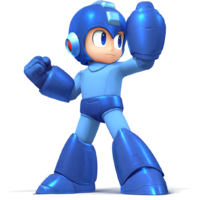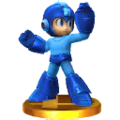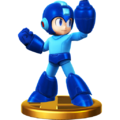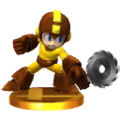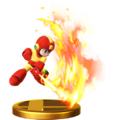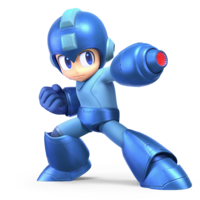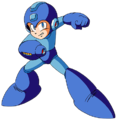Mega Man: Difference between revisions
No edit summary |
Sonic10974 (talk | contribs) No edit summary |
||
| Line 12: | Line 12: | ||
|lastappearance = ''{{s|wikipedia|Dragalia Lost}}'' (update, 2019) | |lastappearance = ''{{s|wikipedia|Dragalia Lost}}'' (update, 2019) | ||
|console = Nintendo Entertainment System | |console = Nintendo Entertainment System | ||
|species = Robot | |species = Robot Master | ||
|gender = Male | |gender = Male | ||
|creator = Keiji Inafune<br>Akira Kitamura | |creator = Keiji Inafune<br>Akira Kitamura | ||
Revision as of 16:20, February 11, 2020
| Mega Man | |
|---|---|
File:MM11-MegaMan.png
Official artwork of Mega Man from Mega Man 11. | |
| Universe | Mega Man |
| Debut | Mega Man (1987) |
| Smash Bros. appearances | SSB4 Ultimate |
| Most recent non-Smash appearance | Dragalia Lost (update, 2019) |
| Console/platform of origin | Nintendo Entertainment System |
| Species | Robot Master |
| Gender | Male |
| Created by | Keiji Inafune Akira Kitamura |
| Article on Wikipedia | Mega Man (character) |
Mega Man (ロックマン, Rockman), also referred to as Mega (ロック, Rock), is a character from the eponymous Mega Man series by Capcom. He was announced as a playable character for Super Smash Bros. 4 in the E3 2013 Nintendo Direct.
Origin
Mega Man is a highly advanced robot with a near-human personality created by Dr. Thomas Light. In the year 20XX, Dr. Light and Dr. Albert Wily worked together to create robots with unprecedented artificial intelligence that could be used to supervise other less advanced robots. The prototype of these robots was known as Proto Man (called Blues in Japan), but having a free-spirited personality, and fearing being tampered with to fix an unstable core, he ran away. Dr. Light theorized that Proto Man ran away because he desired a companion, so he next designed two robots: Rock, designed as a lab assistant, and Roll, designed for house work. Based on these successes, Light and Wily then built six Robot Masters: Cut Man, Guts Man, Ice Man, Bomb Man, Fire Man, and Elec Man. However, Dr. Wily grew jealous of the recognition Light received for their work. Wily began his designs for world conquest and stole the Robot Masters. Seeing Rock and Roll as useless, Wily left them behind, inadvertently creating his ultimate undoing, as Rock would volunteer to be converted into a fighting robot. As Mega Man, he would thwart Wily's plans time and time again.
As Mega Man, Rock possesses the Mega Buster, a weapon that converts his hands into a powerful energy cannon. From Mega Man 4 onwards until Mega Man 9, the Buster can be charged to release a Charge Shot. Beginning in Mega Man 3 and again continuing until Mega Man 9, he also possesses the ability to slide along the ground. Both of these abilities return in Mega Man 11. Mega Man's most impressive power, however, is his Variable Weapons System, which allows him to copy the powers of Robot Masters he defeats. These weapons then prove useful for taking out smaller enemies or another Robot Master weak to that particular weapon in a rock-paper-scissor style system.
Mega Man is consistently shown to have a strong sense of justice, highly valuing peace. These values were what led him to be converted into a fighting robot in the first place, and the games stress Mega Man's never-ending fight to ensure peace. However, Mega Man has his breaking point, as seen in Mega Man 7, where he nearly kills Dr. Wily, tired of his repeated attempts at world domination.
Mega Man has a large group of allies and companions who help him on his adventures. Dr. Light and Roll often serve in an advisory capacity, while other robots help him more directly. Rush, Mega Man's robotic dog, serves as transportation for him by transforming into tools such as a spring or jet. Proto Man often aids his younger brother after a stint of working for Dr. Wily in Mega Man 3. Other less advanced robot helpers include Eddie, who distributes items, Beat, who attacks enemies and saves Mega Man from falling into pits, and Auto, an assistant of Dr. Light who makes parts for Mega Man.
In Super Smash Bros. 4
As a playable character
Mega Man appears as a playable character. He uses copied special weapons from Robot Masters that he fought throughout the original series. Thus, his playstyle is more focused on weapons and range rather than physical combat, in a similar vein to Snake.
Mega Man is placed 27th on the tier list, sitting within the C tier. With his arsenal of projectiles at his disposal, Mega Man is granted a strong spacing game. Some of these projectiles also have useful utility, with Metal Blade being able to be thrown in all 8 directions, Crash Bomber being ideal for pressuring shields, and up aerial having the potential to KO opponents easily at the top blast line. Mega Man also possesses some highly powerful finishers, such as up tilt, down smash, and down aerial, and he also has great air mobility due to his good air speed and fast air acceleration. However, being dependent on projectiles leaves Mega Man at a disadvantage against opponents with reflectors, and his quick falling speed and high weight give him a vulnerability to vertical hits. Overall, Mega Man's high learning curve has not allowed for much tournament representation, but his results have been impressive thanks to the efforts of players such as ScAtt and Kamemushi.
Trophies
- Mega Man
The main hero from Capcom's 1987 action game, Mega Man. He travels from stage to stage, defeating Robot Masters to obtain new weapons. He uses this vast arsenal in Smash Bros. in a variety of ways. Metal Blades, for example, can be fired in eight directions and picked up off the ground!
In 1989, Capcom's new action hero, Mega Man, arrived in Europe! He made his way through levels, defeated bosses and took their weapons. He's got plenty of weapons in this game, too. His Metal Blade, for example, can be thrown in eight directions and goes right through foes! If it sticks in the ground, though, anyone can pick it up.
- Mega Man (Alt.)
Mega Man has more than 10 different weapons at his disposal. His forward air attack, Flame Sword, affects a wide area and doesn't leave much of an opening, making it useful in a variety of situations. His Leaf Shield special spins four leaves around him to deflect projectiles or hurt foes. He can also fire the leaves forward.
Mega Man has more than ten different weapons at his disposal. His forward air attack, Flame Sword, affects a wide area and doesn't leave much of an opening, making it useful in a variety of situations. His Leaf Shield special spins four leaves around him to block attacks projectiles. He can also fire the leaves forwards.
In Super Smash Bros. Ultimate
As a playable character
Mega Man returns as a playable character alongside the entire playable cast of the series in Super Smash Bros. Ultimate, this time as an unlockable character. His moveset is largely the same, though his Final Smash now features Proto Man and Bass.
Spirits
Trivia
- Mega Man, Simon, Hero, and Banjo & Kazooie are the only third-party playable characters in the Super Smash Bros. series to have debuted on a Nintendo system. Mega Man and Simon doing so on the NES games Mega Man and Castlevania, respectively, the Hero debuted on the Nintendo 3DS with Dragon Quest XI (and his alternate costumes, Erdrick and Solo, both debuted on the NES), and Banjo & Kazooie made their formal debut in Banjo-Kazooie for the Nintendo 64.
- Mega Man and Pac-Man are the only playable third-party characters who don't have any voice clips, despite both of them having spoken in their home series.
- Mega Man is the only third-party character to appear in the CGI portions of a newcomer trailer other than their own, namely Bowser Jr. and Ridley's.
- Mega Man's ability to wall jump in the Smash series is a reference to the subseries Mega Man X, where X's wall kick was an integral part of the game.
- Mega Man is the second playable character to be referred to by an alias, rather than a form of their real name, after Snake and predating Bayonetta and Joker.
- Mega Man appeared in various media alongside other Super Smash Bros. playable characters prior to Super Smash Bros. 4:
- SSB4 is the second game to feature Mega Man, Pac-Man and Ryu together, the first being the PlayStation 3 and PlayStation Vita versions of Street Fighter X Tekken.
- Mario appeared with Mega Man in the Super Mario: Die Bescherung comic.
- Sonic appeared with Mega Man in the Worlds Collide and "Worlds Unite" crossover story arcs of Archie Comics' Mega Man and Sonic the Hedgehog comics.
- There are also special variant covers of Archie's Sonic Universe #69, Mega Man #42 and Sonic the Hedgehog #266 that create a Super Smash Bros. based scene depicting Mega Man fighting Sonic and Shadow the Hedgehog on Boxing Ring. [1]
- Ryu also appeared with Mega Man in the first two games of the Marvel vs Capcom series, as well as Street Fighter X Mega Man.
- Ryu's rival, Ken Masters, also appeared alongside Mega Man in Marvel vs. Capcom 2.
- Mega Man, Pit (as "Kid Icarus"), and Simon Belmont (along with cameos from other classic characters, such as Donkey Kong and Link) previously appeared together in the animated series Captain N: The Game Master. Additionally, Samus Aran was a regular character in the comic book tie-in to the show, though Mega Man was absent as the publisher, Valiant Comics, did not have access to characters outside of Nintendo's ownership.
References
|
| |
|---|---|
| Fighter | Mega Man (SSB4 · SSBU) |
| Assist Trophies | Elec Man · Wily Capsule · Zero |
| Stage | Wily Castle |
| Enemy | Mettaur |
| Other | Bass · Energy Tank · MegaMan.EXE · MegaMan Volnutt · Proto Man · Star Force Mega Man · X · Yellow Devil |
| Trophies and Spirits | Trophies · Spirits |
| Music | SSB4 · Ultimate |
| Masterpiece | Mega Man 2 |
